Black History at Millikin University
The first African-American organization at Millikin University was For Soul Only. The organization was established in 1968 in response to an incident. Details of the incident are not included in any Decaturian and are sketchy, at best. The group quickly became one of the most active and influential groups on campus.
For Soul Only (F.S.O.) regularly celebrated Black Emphasis and/or Black History Week. They sponsored many events annually including an annual formal ball, a fashion show, recreation nights, Freshman Picnic, a Food and Toy Drive, Senior Picnic, and Family Day. They were also active within the Decatur community as volunteers to low-income minority students and inviting the community at large to many of their programs on campus. The Decatur community was undoubtedly present when many notable speakers from around the country spoke during Black Emphasis or History Week. Albert Taylor Hall was often full to capacity and left standing room only.
The determination and will of the members of F.S.O. did not end in the organization's infancy. F.S.O. made headlines in the Herald & Review on April 25, 1970 with an act of protest at the Sub (Lower RTUC) on April 24. Students locked themselves in the lower area of the building at 6:30 PM and did not emerge until 9 AM the following day. Signs were placed over the windows of the building denying students use of the union because there was no building on campus specifically for black students. The protest ended when the students were informed that they would be able to meet with the Millikin trustees. F.S.O. was granted permission to use the lower level of the "Old Gym" as their Culture House by the end of the spring semester 1970.
F.S.O. remained active and, in the late 1970s, moved out of the "Old Gym" into a house at 1034 W. Williams St. During the 1982-83 school year, F.S.O. became known as the Black Emphasis Association. In the early 1990s there was a newsletter published called N Da Mix, that started out with only black editors and writers, but quickly became a multicultural publication.
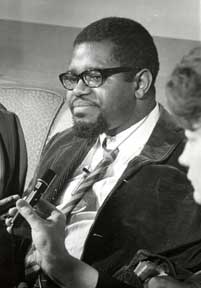
Above: Claude Brown, most famous for his book entitled Manchild in the Promised Land, spoke to an attentive audience in Albert Taylor Hall and was interviewed by the local media. He spoke at a Black Emphasis week event in 1969. His talk was titled "The Essence of the Black Revolution."
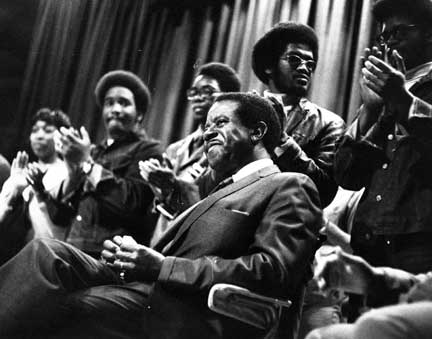
Above: Rev. Ralph David Abernathy, the successor to the Presidency of the Southern Christian Leadership Conference after Martin Luther King's assassination, received a standing ovation to an overflow crowd in Albert Taylor Hall in 1970.
| Right: Pictured is a group of students listening to a lecture during Black Emphasis Week. Lecturers and panel discussions with local leaders were often slated for the week's activities. | 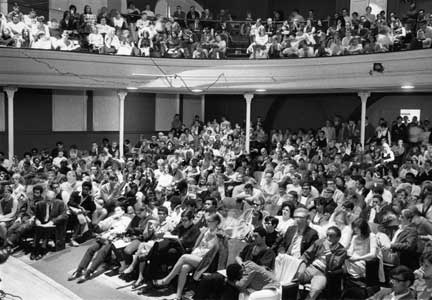 |
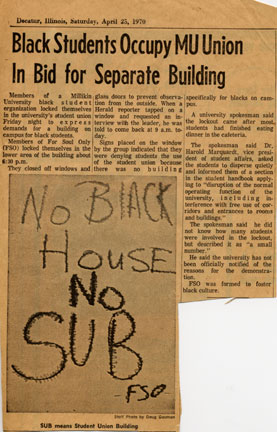 | Left: An article that appeared in the Decatur Herald and Review on April 25, 1970 documents the black students' struggle for their own space on campus. The students staged a lock-in in the student union building. |
| Right: Program of events for the 1969 Black Emphasis Week, one of the first celebrated at Millikin. | 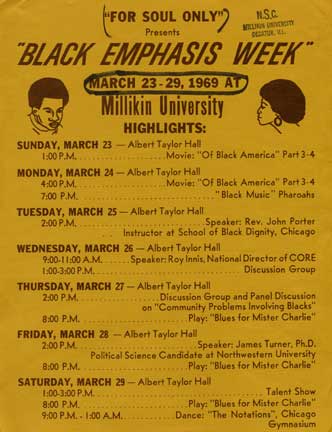 |
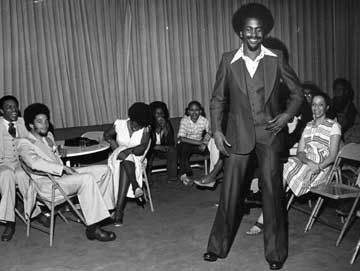
Above: F.S.O. regularly included a fashion show in their Black Emphasis Week celebrations. The students really enjoyed this—notice the table of three people on the left and their reactions.
 |  |
F.S.O. frequently sponsored both talent shows and dances during Black History Week. Students were given a chance to let their talent be known to the Millikin community (above, left) The dances provided students with the opportunity to work on their moves, too (above, right).
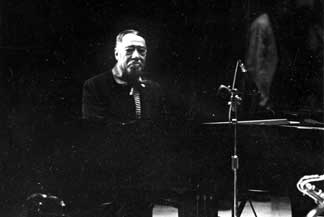 | 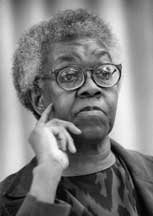 |
Over the years Millikin University has hosted numerous African-Americans of note from many venues of our culture. Pictured above, left is world-renowned jazz artist Duke Ellington who performed with his band for the University Concert Series in 1972. To the right is prominent Chicago poet Gwendolyn Brooks. In 1968 she was named poet laureate of Illinois and in 1972 was conferred an honorary degree by Millikin University.
This page created March 5, 2004
Last modified: March 21, 2005
Copyright 2004: Millikin University Board of Trustees